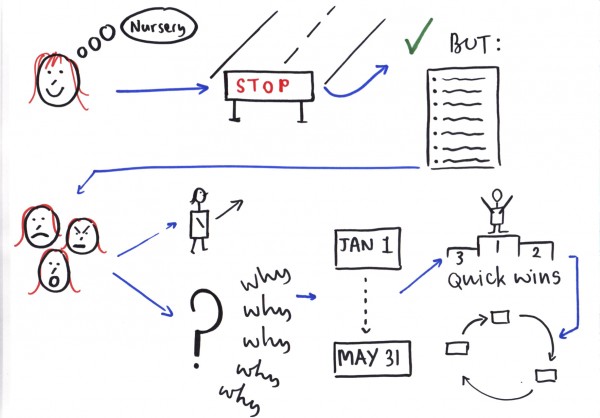
I’m in a transition phase; I’ve left my NHS role and started work as an independent therapist. I find change tricky. I had an interesting conversation with Abi Roper and Tom Starr-Marshall that made me think — why is change in the NHS so difficult? And in a solution-focused kind of way, what makes particular projects successful?
Looking back, there was a pattern to my attempts at service development (try and follow along with the diagram!):
- I’d have an idea, then it felt like people were blocking me, I’d hear: “sounds great, but….” followed by a long list of why it wouldn’t work, or we couldn’t try it.
- I’d feel angry, frustrated and disappointed.
- I’d either: ignore the objectors and try the idea out, maverick style.
- Or start asking questions. This takes time and requires persistence.
- I’d try for quick wins to show the team that the idea was worth piloting.
- Then cycle through the process again, asking more questions and making more small changes, to try and show value.
Sometimes it worked and sometimes it didn’t! So what helped?
- The 5 Whys is a useful exercise for identifying barriers and understanding what was really getting in the way,
- using “yes, and….” (rather than “no, but…”) helped me stay open to other people’s ideas and viewpoints,
- working with allies, and
- focussing on both the end goal and the details, kept me on track.
Have you managed to push new ideas through and make changes? What helped? I’d love to hear your ideas.
We’ll be exploring this issue at the Therapy Ideas Workshop on 17 May. Join us! If you’d like to discuss whether the workshop would be a good fit for you, email me.

I particularly like the ‘yes, and..’ idea. We all need to hear a ‘yes, I hear you’ before we can be willing to adjust! As I’m setting up a new service there are fewer historical ‘no change’ barriers but it still has its challenges of course! I’m going to try the five whys.